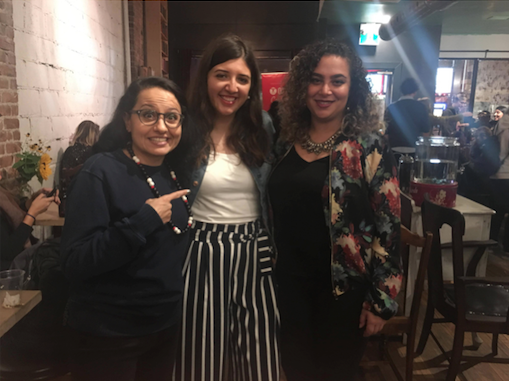Comedians stand up for diversity via Facebook
By Ruth Tecle
A group of Ottawa stand-up comedians is trying to grow the local comedy scene by hearing from underrepresented members of their community.
The Ottawa Comedy Community Facebook group was created in May by comics who decided performers need to be able to raise concerns about workplace safety without fear of retribution.
“All these really famous Canadian comics have horror stories and shows gone wrong between agents and producers and bookers… It’s a job at the end of the day, but is it a job where if you feel safe enough you excel?” said Greg Houston, 32, a local comedian and one of five group administrators.
A town hall-style event where discussion is guided by member feedback is in the works. Members of the Facebook group were asked to fill out a questionnaire, with the option of being anonymous, as a way to set the town hall’s agenda.
“Let’s get some real feedback from the community to see where we need to improve, where we need to be more transparent, and what’s working fine,” Houston said of the questionnaire’s purpose. “Looking at results there are things I didn’t see were an issue.”
It was modelled after a survey conducted by the Fresh Meat festival for the Ottawa theatre community.
“It was able to gather a lot of data from its audience and readjust its mandate,” he said.
Online groups that cater to their niche communities are common. Local comics had already been congregating in a Facebook group that had been active for about a decade. Tensions divided members as issues raised about the safety of marginalized performers devolved into heated online debates.
“We just felt like we could represent the community a bit better than some of the comedians that were (administering) the old page,” said Laura McLean, 27.
She’s a local comedian who has been performing for three years. For McLean, harassment in the comments section was fueled by inactive moderators unable to represent the scene’s growing diversity.
“If the new group was admin-ed by people of various ages and genders and orientations, any issues that come up can be weighed differently,” said McLean.
Shortly after the new Ottawa Comedy Community group was created, the old group was archived by its administrator, rendering it defunct.
Much like the old group, McLean said the new group’s main purpose is still a forum for members to advertise shows or make calls to fill spots in a lineup. It also serves as a resource for people interested in learning more about Ottawa comedy. “We want it to be a place where people can ask questions without fear of being trolled,” she said. “Just because it’s online doesn’t mean it doesn’t count.”
“Recently there’s been a lot of cases of guys in the Toronto comedy scene being (called out as) abusers and I think that’s what really set the fire,” said Anasimone George, 24, a Toronto comedian and producer.
She brought her show SHADE to Ottawa’s Black Squirrel Books and Espresso Bar in September. It’s earned her a reputation for delivering a strong lineup of diverse stand-up comedians.
“The room was packed, I didn’t think that was going to happen, said George. “Besides doing SHADE in Toronto, where I know people will come because it’s a diverse city, to see it happen in Ottawa was really cool, because after the show I even got messages like, ‘We really need this diversity, this doesn’t happen, it’s so hard.’”
George pointed to a fear she suspects some comics have that there won’t be space for their act.
“They freak out when people are like, ‘Don’t do that, that’s abusive’ or ‘Don’t do that, that’s racist.’ They’re like, ‘Well what am I going to say or do? There’s nothing for me to say,’ ” said George. “You can be offensive without having to offend a marginalized group. My comedy is very dirty. I’m not a PC comic, but I’m also not going to be shitting on religions.”
According to McLean, the Ottawa Comedy Community aims to welcome diverse performers and help grow the scene by attracting diverse audiences.
“If it’s more diverse, you shut those (offensive) people and that material down,” she said. “(Comics will have to think), ‘Oh, these people exist, they’re around me and I can’t say or do that anymore.’ ”
The irony of being a tall white male comic taking a leadership role on diversity doesn’t escape Houston.
“There are enough straight white males,” he said, poking fun at the scene’s main demographic.
Before he spearheaded the survey initiative, he was reluctant to be an administrator.
“I don’t want to spend time doing comedy admin work, I want to focus on my act… Even in the beginning I was like, I don’t want to do this,” he said.
But he recognized that after being an active performer and producer in Ottawa for five years, he’s developed the skills and connections to organize a way to hear from the broader community.
“How do we remove some of the barriers so that people who’ve been marginalized have the same access to resources as the white males who’ve been dominating comedy?” said Houston.
“You have to let everyone weigh-in, especially people who have no experience in comedy and have done two open mics and (other) people have being doing it for 25 years. Their opinions all matter at the end of the day, and you’ll see stuff in your blind spot that you wouldn’t see otherwise.”
Some comedians are still resistant to having hands-on administrators, and accuse the group of censorship.
“It’s not the joke police,” said Houston.

